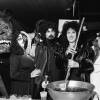Halloween is still a ways away, but things are getting spooky in Salem. The Salem Horror Fest, a film festival celebrating all things scary, returns this weekend and next. Morning Edition co-host Jeremy Siegel talked to the festival's founder, Kay Lynch, about what to expect from the festival and why people love to be scared. More information about the festival is available at salemhorror.com.
Jeremy Siegel: I was curious to ask you, because I'm a huge fan of horror and I always have a hard time talking with people who aren't big fans of horror about it. What makes people love horror movies?
Kay Lynch: Oh, gosh, there's so many reasons. But the thing that's always drawn me to the horror genre is the ways in which it's helped us cope and interpret the world around us, or are even our own experiences. So, for example, growing up, most of my life I've suffered from depression and anxiety, but was surrounded by people who didn't understand it or didn't believe it. And so it was very isolating. And through horror, which is, of course, known for its pervasive ambiance of dread — when I see that, I recognize that world. I guess that is actually how I experience my life. And even though it's not necessarily pleasant, it is something that makes me feel less alone because it means this experience exists elsewhere. And so I think a lot of people are drawn to horror as a way to find catharsis for some of the darker things in our society.
Siegel: So you mentioned how it was sort of at a young age that horror began to help you cope with some of your own feelings. Are there any movies that stuck out to you when you were younger as examples of that happening?
Lynch: "Carrie." I'm queer. "Carrie" Is like the queer sacred text of being queer in high school. I had seen a lot of horror films on TV, like Saturday afternoons, that kind of thing. But it wasn't until I saw "Carrie" that I realized what horror could be or the feeling that it could bring out of me. There's a part at the very end — it's actually a very cheap stinger, it's the very cheap jump scare — but I almost fell out of the couch and I felt like I was literally having a heart attack. I was like, what? I didn't know a movie could make me feel this viscerally upsetting.
And so at the time, in biology class, there was a box for anonymous questions. Most of us are going through puberty at the time, so that's really kind of like what it is about, for people who are a little shy to ask any questions. And the only question I ever put in that box was: What is the feeling that you get when you're watching a horror movie and it feels like you're having a heart attack? And we learned all about adrenaline that day.
Siegel: So this weekend and the next weekend, a bunch of people are going to be convening in Salem to get that feeling of being freaked out together. What inspired you to start the Salem Horror Fest?
Lynch: So in some ways it was inevitable. For a long time I thought it was actually kind of ludicrous that one didn't already exist. I mean, we are the Halloween capital of the world. But what actually got me to quit my job and make it was the 2016 election. And it was just such a traumatic moment for so many people. And a very clear example of how fear can be manipulated and weaponized against people, especially minority groups. And so there was a lot of fear and anxiety just in everyday life.
Again, being queer, I'm very used to feeling ostracized and othered. And so my hope for the festival is to bring people together who need that sense of belonging, especially post-pandemic.
More Film & TV
And I just find that people who are into horror are very intellectually curious in a lot of ways. Because horror does have a lot of schlocky elements to it, and high camp, and really gruesome ideas and visuals. But I think at its best, the horror represents things in us, in our culture, that are genuinely frightening. And we need to experience that and share that and talk about it in a way that is one step removed from how heated and frustrating and terrifying the real-life politics can be. And so I've always tried to approach this as a form of media criticism, and in programing films that create conversation. And in more recent years, as we've grown, we've been able to use our platform to elevate new voices that are coming through. We also have so many queer filmmakers. There's something in the water right now. There's so many, particularly young. Like last year, our last festival, our jury winner was a 17-year-old trans girl from Australia. You know, preteens have a lot to be afraid of right now. And so I think that it's great that so many of them are using this medium to hopefully find catharsis.
And, you know, Roger Ebert always called movies empathy machines. And so when I think about horror films, I think this is a way for us to experience each other's fear in a way, to better understand it or to relate to it. And in doing so, we can become a little less alone.









